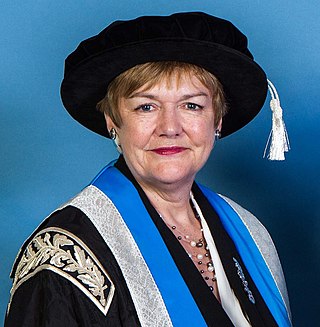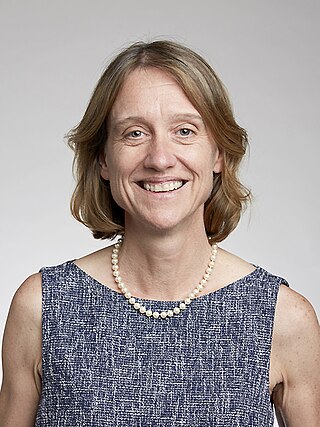Biotechnology and Biological Sciences Research Council (BBSRC), part of UK Research and Innovation, is a non-departmental public body (NDPB), and is the largest UK public funder of non-medical bioscience. It predominantly funds scientific research institutes and university research departments in the UK.
The Harkness Fellowship is a program run by the Commonwealth Fund of New York City. This fellowship was established to reciprocate the Rhodes Scholarships and enable Fellows from several countries to spend time studying in the United States.
The Engineering and Physical Sciences Research Council (EPSRC) is a British Research Council that provides government funding for grants to undertake research and postgraduate degrees in engineering and the physical sciences, mainly to universities in the United Kingdom. EPSRC research areas include mathematics, physics, chemistry, artificial intelligence and computer science, but exclude particle physics, nuclear physics, space science and astronomy. Since 2018 it has been part of UK Research and Innovation, which is funded through the Department for Business, Energy and Industrial Strategy.
The Arts and Humanities Research Council (AHRC), formerly Arts and Humanities Research Board (AHRB), is a British research council, established in 1998, supporting research and postgraduate study in the arts and humanities.
Dame Hazel Gillian Genn, DBE, KC (Hon), FBA is a leading authority on civil justice whose work has had a major influence on policy-makers around the world, and is a former Dean of the Faculty of Laws and Professor of Socio-Legal Studies at University College London.
The Economic and Social Research Council (ESRC), formerly the Social Science Research Council (SSRC), is part of UK Research and Innovation (UKRI). UKRI is a non-departmental public body (NDPB) funded by the UK government. ESRC provides funding and support for research and training in the social sciences. It is the UK's largest organisation for funding research on economic and social issues.

Professor Pamela Gillies is a Scottish academic and educator who served as Principal and Vice-Chancellor of Glasgow Caledonian University from March 2006 until January 2023.

Denise Anne Lievesley is a British social statistician. She has formerly been Chief Executive of the English Information Centre for Health and Social Care, Director of Statistics at UNESCO, in which capacity she founded the UNESCO Institute for Statistics, and Director (1991–1997) of what is now the UK Data Archive.
Barbara Jane Elliott is a British sociologist and academic. She is Professor of Sociology at the University of Exeter. From October 2014 to September 2017 she was chief executive of the Economic and Social Research Council. Her research uses longitudinal, qualitative and quantitative methodologies to explore issues of gender and employment.

The Centre For Macroeconomics (CFM) is a research centre in London dedicated to the investigation and development of new methodologies and research in order to inform economic policy decisions. It also focuses on ways to alleviate the effects of the global economic crisis through its careful study. The CFM is funded by the Economic and Social Research Council (ESRC), and was founded in 2012. It is one of the larger research centers in the world dedicated to the study of financial crises.
Julia Mary Black is the strategic director of innovation and a professor of law at the London School of Economics and Political Science (LSE). She was the interim director of the LSE, a post she held from September 2016 until September 2017, at which time Minouche Shafik took over the directorship. She is the president of the British Academy, the UK's national academy for the humanities and social sciences, and became the academy's second female president in July 2021 for a four-year term.
Rosalind Louise Smyth CBE is an Irish-British paediatrician. She is Professor of Child Health at UCL the Director of the UCL Great Ormond Street Institute of Child Health from 2012 until 2022. She has been Vice Dean Research in the UCL Faculty of Population Health Sciences since 2022.

Julia Alison Noble is a British engineer. She has been Technikos Professor of Biomedical Engineering at the University of Oxford and a fellow of St Hilda's College since 2011, and Associate Head of the Mathematical, Physical and Life Sciences Division at the university. As of 2017, she is the chief technology officer of Intelligent Ultrasound Limited, an Oxford spin-off in medical imaging that she cofounded. She was director of the Oxford Institute of Biomedical Engineering (IBME) from 2012 to 2016.In 2023 she became the Foreign Secretary of The Royal Society.

Sarah (Sally) Lois Price is Professor of Physical Chemistry at University College London.
The National Centre for Social Research (NatCen) is a registered charity and is the largest independent social research institute in the UK. The research charity was founded in 1969 by Sir Roger Jowell and Gerald Hoinville with the aim of carrying out rigorous social policy research to improve society.
Sharon Jayne Peacock is a British microbiologist who is Professor of Public Health and Microbiology in the Department of Medicine at the University of Cambridge. Peacock also sits on Cambridge University Council.
Jane Cecelia Falkingham is a Professor of Demography and International Social Policy at the University of Southampton. She is also Vice-President at the University of Southampton, and Director of the ESRC Centre for Population Change and Principal Investigator of ESRC Connecting Generations. She is Chair of Population Europe. She was President of the European Association of Population Studies (EAPS) between 2018 and 2020, and was President of the British Society for Population Studies between 2015 and 2017.
Louise Heathwaite is a British environmental scientist. She is Distinguished Professor in the Lancaster Environment Centre at Lancaster University and Pro-Vice-Chancellor of Research and Enterprise. She is a hydrochemist working on diffuse environmental pollution, especially the pathways of nitrogen and phosphorus loss from agricultural land to water.
Daisy Fancourt is a British researcher who is an Associate Professor of Psychobiology and Epidemiology at University College London. Her research focuses on the effects of social factors on health, including loneliness, social isolation, community assets, arts and cultural engagement, and social prescribing. During the COVID-19 pandemic Fancourt led a team running the UK's largest study into the psychological and social impact of COVID-19 and established the international network COVID Minds, aiming to better understand the impact of coronavirus disease on mental health and well-being.

Jennifer Rubin is a British social scientist and policy analyst who is professor of public policy at King's College London. A graduate and doctorate in social and political sciences, her research covers a wide area including research policy, government policy, public health and social care. She is elected Fellow of the Academy of Social Sciences. She is currently the Chief Scientific Officer at the UK Home office.






